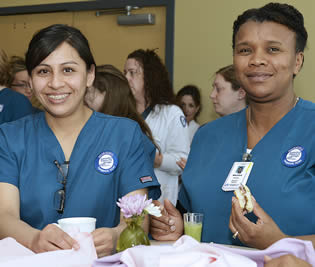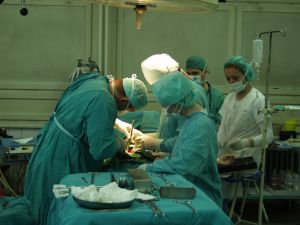Want to find out how to write a CNA cover letter for best results? When you apply for a job as a certified nursing assistant, be clear in your cover letter when and this includes your education, training, work experience, and dedication to the health profession. There may be a tight competition in applying for the job so it is essential that you express yourself in the best possible way.

CNA’s or certified nursing assistants are the ones who help patients of different ages with various healthcare needs. They work under the supervision of a Registered Nurse or a Licensed Practical Nurse. Nursing assistants work in different settings including the hospitals, nursing homes, adult day care centers, assisted living facilities, and personal homes. These professionals are the eyes and ears of their supervisors and like the nurses they have day-to-day contact with patients. This makes them the ones to relay pertinent information to the nurses supervising them.
The key to the success in getting the job is to have an effective cover letter for the job application as a certified nursing assistant. It needs to be written concise as well as standardized. The cover letter is a direct expression to the employer having the goal to convince them that you are the person that best fits the job. It must be read like you are actually specially writing to the employer rather than just writing a general letter. A connection needs to be built because this will also reflect your understanding of the job.
When you have gathered information already, it is now time to begin thinking as to the content of the letter. It is essential that you include relevant skills as well as your experience similar to the position when you write the cover letter. Talk a little about your personal life but be certain to relate it to professional life as much as possible. Be sure to show your enthusiasm and passion for the job position.
Below are some tips that can help you in further improving your cover letter in order to obtain bigger chance in getting hired for the job.
– As much as possible, try relating your work experience as well as skills to the projects which the company has involvement with. Moreover, connect them to the position which you are applying for.
– Separate the cover letter from your resume. The two are different so make sure that both do not say the same thing.
– Be direct to the point by making the cover letter not too long. One page should be enough for length.
– Be certain that you do not commit errors especially with regards to formatting, grammar, and spelling. Use only one font as well as font size for uniformity.
– You must send a cover letter when applying for a job even if you are not asked to. This is going to add a personal touch showing the employer your willingness in getting the job.
– Remember to thank the employer for considering your application and for devoting his or her time.
Here is an example of a nursing assistant cover letter for employment – Image
Visit this page to learn how to write a CNA resume.
 the assessment or care plan which are directed according to the supervisors. It is essential that the nursing assistant must hold responsibility or accountability for the interventions that are being carried out for the clients.
the assessment or care plan which are directed according to the supervisors. It is essential that the nursing assistant must hold responsibility or accountability for the interventions that are being carried out for the clients. grooming, feeding the patient and changing the lines. Orderlies are in charge of patients scheduled for transport to another department either via wheelchair or stretcher.
grooming, feeding the patient and changing the lines. Orderlies are in charge of patients scheduled for transport to another department either via wheelchair or stretcher. In some states where CNAs are allowed to administer medication and IV as well as work in
In some states where CNAs are allowed to administer medication and IV as well as work in  render direct restorative care as well as delegated therapy tasks and these include active and passive range of motion, special positioning techniques, ambulating, bladder restraining, and restorative dining.
render direct restorative care as well as delegated therapy tasks and these include active and passive range of motion, special positioning techniques, ambulating, bladder restraining, and restorative dining. the basic daily tasks. They play a vital role in the lives of the patients as they are the ones who have extensive contact with them, thus, leaving them the duty to keep the nurses up-to-date regarding the essential information about the conditions of the patients.
the basic daily tasks. They play a vital role in the lives of the patients as they are the ones who have extensive contact with them, thus, leaving them the duty to keep the nurses up-to-date regarding the essential information about the conditions of the patients. There are three most common ways to become a RN. The most typical path is taking up an Associate Degree in Nursing (ADN) in which it only requires the student to attend a two-year program at a junior or community college. Having a diploma program is the second choice which lasts for about three years and is available through hospitals. Lastly, a Bachelor of Science in Nursing (BSN) degree, like any other degree programs, requires four school years to finish and is granted by a university or college.
There are three most common ways to become a RN. The most typical path is taking up an Associate Degree in Nursing (ADN) in which it only requires the student to attend a two-year program at a junior or community college. Having a diploma program is the second choice which lasts for about three years and is available through hospitals. Lastly, a Bachelor of Science in Nursing (BSN) degree, like any other degree programs, requires four school years to finish and is granted by a university or college. The nursing assistants relay whatever changes on the condition of the patients to the registered nurse for further assessment to be done. In order to succeed as a CNA, there are a lot of qualities needed. The nursing assistant must have the organization, efficiency, and is able to do multi-tasking. The career being a CNA is a good choice for career stability and it is perfect for those who have the dedication in helping others.
The nursing assistants relay whatever changes on the condition of the patients to the registered nurse for further assessment to be done. In order to succeed as a CNA, there are a lot of qualities needed. The nursing assistant must have the organization, efficiency, and is able to do multi-tasking. The career being a CNA is a good choice for career stability and it is perfect for those who have the dedication in helping others. registered nurses. They cannot do the responsibilities of a
registered nurses. They cannot do the responsibilities of a  There are a lot of nursing graduates who prefer to work as nursing assistants first in order to gather experience in the medical field especially if they failed to pass the nursing licensure exam. Their background allows them to challenge the exam without having to undergo an expensive training program.
There are a lot of nursing graduates who prefer to work as nursing assistants first in order to gather experience in the medical field especially if they failed to pass the nursing licensure exam. Their background allows them to challenge the exam without having to undergo an expensive training program. First, you need to know what tasks are given to a LVN for you to have an overview of the skills that you would need to add to your current skills. Some of them are to supervise nursing assistants, administer medication to patients, do laboratory tests, assess your patient’s condition, transport and feed them, give injections and IV, as well as giving basic care, cleaning them, and preparing their rooms before they arrive. With your added knowledge, you can also teach your patients about healthcare.
First, you need to know what tasks are given to a LVN for you to have an overview of the skills that you would need to add to your current skills. Some of them are to supervise nursing assistants, administer medication to patients, do laboratory tests, assess your patient’s condition, transport and feed them, give injections and IV, as well as giving basic care, cleaning them, and preparing their rooms before they arrive. With your added knowledge, you can also teach your patients about healthcare. finish your secondary education first before heading on to college. This may sound easy for some, but if you are thinking about entering nursing, then you should be prepared to present your transcript with good grades in the most important subjects that will be needed for nursing. So this means that you also need to study well during your high school days. A grade of C or higher and a 3.0 GPA will be the minimum standard in applying for a nursing course.
finish your secondary education first before heading on to college. This may sound easy for some, but if you are thinking about entering nursing, then you should be prepared to present your transcript with good grades in the most important subjects that will be needed for nursing. So this means that you also need to study well during your high school days. A grade of C or higher and a 3.0 GPA will be the minimum standard in applying for a nursing course. The responsibilities of Nurse Aide instructor include the following:
The responsibilities of Nurse Aide instructor include the following: